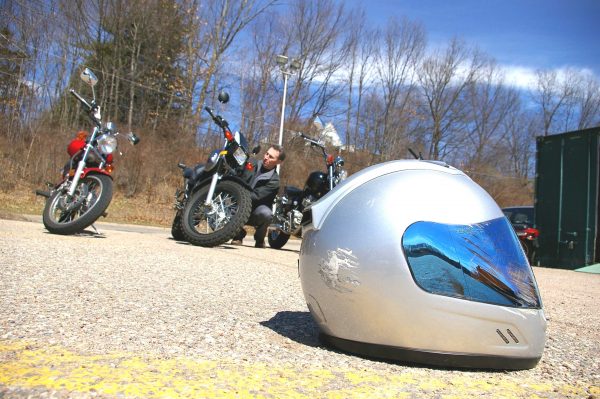HARTFORD – It’s usually an extremely one-sided argument whenever a member of the Connecticut General Assembly proposes that the state implement a universal helmet law. The vocal “pro-choice” crowd repeatedly succeeds in snuffing helmet legislation. This time, though, there are some groups actually backing Bill No. 6048 that was introduced last month by Rep. Tony Guerrera (D. 29th District).
 AAA Northeast and the Connecticut Rider Education Program immediately stepped up in support and, now, the Northeast Dualsport Riders club and the state Department of Transportation have come out in favor of the bill as well.
AAA Northeast and the Connecticut Rider Education Program immediately stepped up in support and, now, the Northeast Dualsport Riders club and the state Department of Transportation have come out in favor of the bill as well.
“NDR is 100 percent pro helmet. As a matter of fact, it is a requirement of riding with the group. Full ATG-ATT is also strongly encouraged and mandatory on our more technical trail rides,” said Victoria Zandonella, who oversees the roughly 100-member group. (Zandonella writes the “Off The Beaten Path” column for RIDE-CT & RIDE-NewEngland.)
“Safety has always played a primary role within NDR as broken bodies wreck a riding season and nobody wants that,” Zandonella noted.
Meanwhile, in an email last week, DOT spokesman Kevin Nursick wrote, “CT DOT believes that motorcyclists should wear appropriate safety gear, and the most important safety item is, indeed, a helmet. We do support mandatory helmet usage. ”
Bill No. 6048 would require all adult motorcycle operators and their passengers to wear helmets. State law currently mandates that only operators younger than 18 wear a helmet. Everyone else may go lidless, which has been the case since 1976 when Connecticut repealed its universal helmet law. A dozen or more attempts since then to reinstate the helmet requirement have been rejected.
Guerrera believes the helmet issue warrants discussion – if only because roadways are more dangerous than in the past, filled with distracted drivers who are hell-bent on texting. “My concern is for the riders. It’s awful out there,” he told RIDE-CT & RIDE-NewEngland, explaining that conversations with concerned constituents prompted him to introduce the bill. “I think we need a dialogue as it’s been a while.”
Guerrera, a former motorcycle rider, said that he’s voted against helmet legislation in the past. Regarding the implementation of a helmet law now, he said, “I’m not saying we should have it or not have it.” It’s just that the changing road situation “calls for us to have a hearing to talk about this.”
Fighting the bill is the Connecticut Motorcycle Riders Association, the politically-active, non-profit organization that represents one segment of the riding public. According to the organization’s Facebook page, CMRA members “have been hard at work to oppose the mandated helmet bill.”
The CMRA post emphasized, “Your adult freedom of choice is the core issue here.”
The AAA Northeast motor club has previously conceded that it will be an uphill battle to get a helmet bill passed in Connecticut. “I know it will be a tough sell in this state to pass such a law, but it’s something that we need,” wrote Fran Mayko, public affairs specialist for AAA Northeast, in an email.
“AAA Northeast has always supported the use of protective gear. We will do so again this legislative session by either testifying publicly in favor of passage of such a law or by sending in testimony,” Mayko wrote.
Mayko also noted that AAA Northeast recently surveyed nearly 3,000 members and non-members in Connecticut, Massachusetts, Rhode Island and New York on a variety of issues. An overwhelming 76 percent of those responding supported a universal helmet law. Massachusetts and New York currently require all riders to be helmeted, while Rhode Island’s law covers riders 20 and under.
Also backing Guerrera’s bill is CONREP. “A universal helmet law is the single most effective countermeasure to prevent serious injury and death on a motorcycle,” wrote CONREP’s state coordinator, Nick Just, in an email.
Nationally, there is also support for helmet legislation. The website of the Insurance Institute for Highway Safety (IIHS) reports, “Helmets decrease the severity of head injuries and the likelihood of death. The federal government estimates that wearing a helmet reduces the risk of dying in a crash by 37 percent. Unhelmeted riders are three times more likely than helmeted ones to sustain traumatic brain injuries in the event of a crash.”
In Michigan, which repealed its universal helmet law in 2012, head injuries rose as riders ditched protective headgear. A study by the IIHS and the University of Michigan reveals that “the percentage of hospitalized trauma patients with a head injury rose 14 percent in the post-repeal period” and “head injuries due to skull fractures rose 38 percent.”
Meanwhile, the death rate in Michigan among unhelmeted riders is nearly twice that of helmeted riders.
Guerrera’s bill has been forwarded to the Transportation Committee, which will schedule a hearing. There’s also a second helmet bill – No. 6281 – introduced by Rep. Rick Lopes (D-24th District) that would require operators of scooters of less than 50cc to wear a helmet. It has also been sent to the Transportation Committee.
– By Bud Wilkinson
 Ride CT & Ride New England Serving New England, NYC and The Hudson Valley!
Ride CT & Ride New England Serving New England, NYC and The Hudson Valley!




